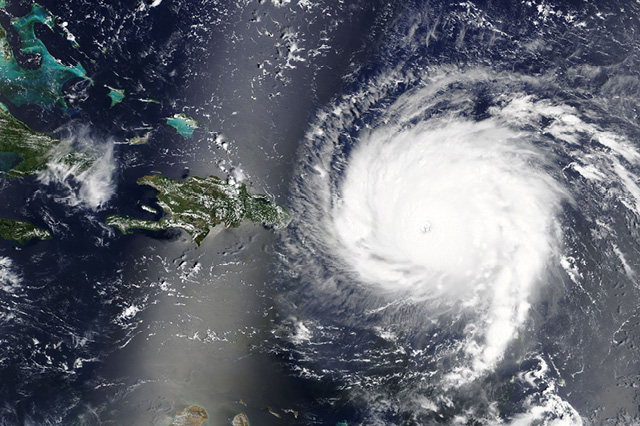The United States has a tumultuous relationship with weather, bearing witness to some of the most devastating natural disasters in history. Our sheer size and dynamic terrain mean we’re easily subject to all kinds of frightful weather scenarios including tornadoes, blizzards, floods and perhaps the most feared of all, hurricanes.
Known for being unpredictable, hurricanes have a knack of making their way around, wreaking havoc from the south all the way up the eastern seaboard, leaving immeasurable destruction in their wake. On average, there are about 10 tropical storms that develop in the Atlantic each year, with six of those storms becoming hurricanes.
Amid all the hurricanes the U.S. has weathered over the years, there are some that have truly made history. These are some of the worst hurricanes ever to touch down in the United States, forever altering the lives of those caught in their paths.
The Worst Hurricanes in U.S. History: A Timeline
The Great Galveston Hurricane of 1900
Regarded as one of the deadliest natural disasters in U.S. history, the Great Galveston Hurricane of 1900 claimed an estimated 8,000 to 12,000 lives. This colossal storm struck the island city of Galveston, Texas, on Sept. 8, 1900, with winds reaching 140 mph. The city, which was already vulnerable due to its low-lying elevation, faced storm surges up to 15 feet that completely submerged the area. The tragedy prompted significant changes in hurricane preparedness, leading to the construction of a seawall and the implementation of more robust early warning systems.
The Labor Day Hurricane of 1935
The Labor Day Hurricane of 1935 made landfall in the Florida Keys with wind speeds surpassing 185 mph. The storm struck with such force that the entire Overseas Railway connecting the Florida Keys was destroyed. Hundreds of World War I veterans working on the railway lost their lives, further compounding the human tragedy.
Hurricane Camille, 1969
This category 5 hurricane – one of only four to ever make landfall in the United States – arrived along the Gulf Coast of Mississippi in August 1969. With winds exceeding 175 mph, Camille’s storm surge resulted in the deaths of approximately 259 people and caused extensive damage to infrastructure and homes. The storm brought unprecedented rainfall, triggering flash floods and landslides in the mountainous areas of Virginia.
Hurricane Andrew, 1992
Hurricane Andrew struck South Florida in August 1992. With wind speeds peaking at 175 mph, Andrew leveled entire neighborhoods and caused catastrophic damage estimated at $26.5 billion. The storm claimed the lives of 26 people and thousands more were left homeless. After Andrew, many insurance companies started to establish hurricane deductibles in coastal states.
Hurricane Katrina, 2005
One of the most infamous hurricanes in U.S. history, Hurricane Katrina struck the Gulf Coast with unparalleled force, primarily impacting the city of New Orleans. The catastrophic failure of the city’s levee system resulted in massive flooding, displacing hundreds of thousands of residents and causing over 1,200 fatalities. The response to this disaster was marred by deficiencies in disaster management and emergency response, highlighting the need for more effective coordination between federal, state and local authorities during times of crisis.
Hurricane Ian, 2022
A rare category 5, Ian was the deadliest hurricane to hit Florida since the Labor Day Hurricane of 1935 and is currently the fifth-strongest hurricane on record to make landfall in the U.S. With winds peaking at more than 160 mph and a devastating surge (an estimated 10-15 feet), the storm claimed around 160 lives along its path, which continued as a category 3 hurricane in western Cuba and finally a category 1 in South Carolina. The storm surge alone leveled southwestern Florida’s Sanibel Causeway and the Matlatcha Bridge, resulting in about $113 billion in damage.
Hurricane Helene, 2024
Hurricane Helene made landfall in Florida’s Big Bend in September 2024 as a Category 4 storm, causing catastrophic flooding and wind damage across the southeastern U.S. Its path of destruction extended from Florida to North Carolina, with severe flash flooding in mountainous areas resulting in over 230 deaths. In Asheville, North Carolina, record-breaking floods submerged parts of the city, leaving residents cut off from communication for days. Damage estimates have reached approximately $200 billion, although it could be years before the extend of the damage has been accurately assessed.
The worst hurricanes in U.S. history stand as reminders of the immense destructive power of nature, and how being prepared is pivotal for rebuilding. Over the years, how insurance companies handle coverage for hurricanes has changed dramatically and it’s important to make sure you are properly covered and fully understand your policy.
Making sure you are protected with homeowners insurance through AAA is not only essential, it gives you the peace of mind you need in the event of an unexpected natural disaster. Learn more about AAA Insurance.
This article has been updated and republished from a previous version.
9 Thoughts on “The Worst Hurricanes in US History”
Leave A Comment
Comments are subject to moderation and may or may not be published at the editor’s discretion. Only comments that are relevant to the article and add value to the Your AAA community will be considered. Comments may be edited for clarity and length.













I agree that the Great New England Hurricane of 1938 should be included in your list. My understanding is that at the time the news of the 1938 Hurricane was mostly eclipsed by news of what was happening with Adolf Hitler in Europe.
What about Hurricane Maria? That was one of the deadliest. Last I heard, Puerto Rico was still part of the U.S.
Agreed. The response to Hurricane Maria is only one of many times the people of Puerto Rico were sidelined and treated as second class. Such a disturbing pattern.
the hurricane of 1938 was worse that most of the listed ones
Yes! Was just about to say the Hurricane of 1938 was left out!
The Great New England Hurricane of 1938 devastated the coastline with wind gusts up to 186 mph and 50 foot waves. About 700 people died and 63,000 were left homeless. Two billion trees went down.
How could you NOT have Hurricane Sandy on this list???????
Because Sandy was NOT a hurricane.
Sandy was a superstorm consisting of a Noreaster and a hurricane, so a hurricane was somehow involved.